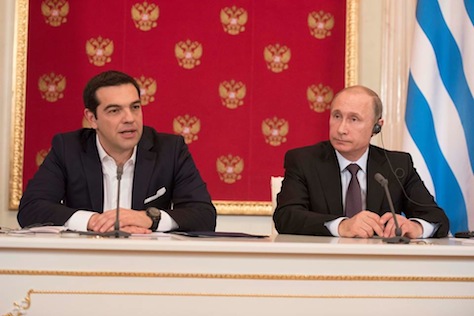It’s a sign that fiscal affairs in Greece are bad when the sensible Plan B to cover the Greek government’s looming shortfall involves loans from Moscow (despite protests to the contrary).![]()
Greek prime minister Alexis Tsipras has dismissed European sanctions against Russia, and he met Russian president Vladimir Putin in Moscow earlier this week, signaling to the European Union that Greece is keeping its options open if ongoing debt talks fail. Though Tsipras didn’t seek any financial assistance from Putin, he failed to convince Putin to lift a ban on Greek agricultural exports.
The even more outlandish Plan B involves demanding reparations from Germany for World War II damages, amounting to €278.7 billion. Perhaps not coincidentally, that’s just a little more than the €240 billion in financing that Greece has received in the last half-decade under two bailout programs from the European Commission, the European Central Bank and the International Monetary Fund.
Today, Greece’s government, not even three months old, will repay a €460 million portion of its debt to the International Monetary Fund. But that doesn’t mean that all is well in Athens, where last year’s green shoots of economic recovery are now obscured by the uncertainty of a leftist administration that’s engaged in brinksmanship over Greece’s financing and, ultimately, over the wider question of national fiscal sovereignty in today’s eurozone.
* * * * *
RELATED: EU should give Tsipras a chance to govern
RELATED: What a Eurogroup-brokered deal with Greece might look like
RELATED: Seven lessons from the Greek election results
* * * * *
Why Tsipras can’t (and won’t) make a deal on Berlin’s terms
Without a deal, Tsipras will go down in history as the prime minister who led Greece out of the eurozone, willingly or not. Politically, however, Tspiras can’t agree to any deal that the Eurogroup seems to be offering. That’s increasingly a recipe for Tsipras to call fresh elections early this summer, but there’s no guarantee the results will solve the Greek-EU political quagmire.
Tsipras and his anti-austerity SYRIZA (the Coalition of the Radical Left — Συνασπισμός Ριζοσπαστικής Αριστεράς) were elected three months ago on a pledge to renegotiate the terms of Greece’s debt with its European lenders and end the harsh austerity measures that have exacerbated Greece’s contracting economy and growing unemployment. But the EU’s leaders, including Commission president Jean-Claude Juncker, German chancellor Angela Merkel and, presumably, ECB president Mario Draghi, no longer fear the ‘contagion’ effect of a Greek eurozone exit. Continue reading What are the chances of snap elections (again) in Greece?
